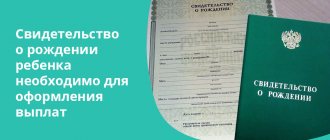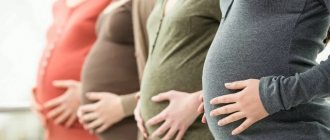Guardian - who is it?
To clarify who a guardian is, it is necessary to define the concept of legal capacity. This is an opportunity to conclude deals yourself, apply for benefits or subsidies, contact government bodies with applications, and vote in elections. Every person in the Russian Federation is granted full legal capacity automatically at the age of 18.
Children between the ages of 0 and 13 are also considered legally incompetent. The parents act as their guardian.
But sometimes parents cannot fulfill their responsibilities. For example, due to a serious illness or premature death. Or they don’t want to do it because of alcoholism or drug addiction.
In such a situation, the state will support, provide for and raise the child. State policy is aimed at reducing the number of children who are raised in organizations (shelters, orphanages, temporary placement centers), so the guardianship authorities are trying to place the child with a family.
Example
After the death of her husband, Irina raised a 5-year-old daughter. The woman began to abuse alcohol. She was no longer interested in raising and educating the child. The girl went to kindergarten dirty and poorly dressed. The kindergarten teachers reported the situation to the guardianship. Measures to preserve the family did not produce results and Irina was deprived of parental rights. The grandmother took custody of her granddaughter.
Candidates from relatives are considered first. Guardianship department specialists personally meet with the child’s adult siblings, grandparents, aunts and uncles. If a relative lives in another area, then the request is sent to the guardianship department at his place of residence. All this is necessary for the child to continue to live in his birth family.
Only if each relative writes a refusal to accept the child into guardianship, specialists will select a guardian from among strangers. And during this period he will be in a temporary detention center.
To become a guardian, a citizen must meet a number of requirements:
- be the owner or tenant of an apartment;
- not have a criminal record for a serious or especially serious crime (murder, rape);
- do not have diseases provided for by Government Decree No. 117 of 2013 (tuberculosis, alcoholism, drug addiction, oncology).
A potential guardian must be trained in a foster care school. These are special courses, directions for which can be obtained from the guardianship department. If a grandparent, brother or sister wants to become a guardian, they do not need to undergo training.
Now let's answer the question: who is a guardian? A guardian is a person who cares for an incapacitated child, a disabled person or an elderly person. He represents his interests and is ready to take on the functions of the child’s parent until adulthood. A relative or a stranger who meets the requirements of the law can become a guardian.
Payments for children from 3 to 7 years old
In 2021, families will begin to receive monthly payments for children aged 3 to 7 years according to new rules (Resolution of the Government of the Russian Federation dated March 31, 2021 No. 489).
A family can qualify for payments if its average per capita income does not exceed the regional subsistence minimum per capita for the second quarter of the year preceding the year of application for a monthly payment. Payments are made on an application basis. An application and a set of documents confirming the average per capita family income can be submitted to the territorial department of social protection in person on paper, through the MFC, as well as through the unified portal of State Services or through the regional portal of State Services.
However, this year the payment amount will change. The basic amount of such payment, as before, will be 50% of the children's regional subsistence minimum. If, as a result of receiving the payment, the family’s income does not reach the regional minimum, then the payment will be assigned in the amount of 75% of the minimum. If, in this case, the average per capita family income does not reach the subsistence level, then the payment will be assigned in the amount of 100%.
In addition, according to the new rules, when calculating need, children who have already reached working age and are students will be taken into account - such children will be taken into account as part of the family when calculating average per capita income. At the same time, the family composition taken into account when calculating the average per capita income will not take into account persons deprived of parental rights, citizens who are fully supported by the state, citizens undergoing military service on conscription, persons serving a sentence of imprisonment or against whom a preventive measure has been applied in the form of detention.
Also, in 2021, in order to assign payments to children aged 3 to 7 years, it will no longer be necessary to submit documents containing information about alimony (Order of the Government of the Russian Federation dated July 29, 2020 No. 1976-r). The territorial social protection authority will independently receive this information through the interdepartmental electronic interaction system.
The legislative framework
Guardian families raising orphans and children left without parental care have the right to receive benefits and allowances.
The status of an orphan or a child left without parental care is assigned by a resolution of the district administration if the child’s parents:
- Died;
- Declared dead in court;
- Recognized as missing;
- Deprived of parental rights;
- Limited parental rights;
- Wanted;
- Unknown.
If guardianship is appointed temporarily (at the request of the mother and father), then the guardian has no rights to payments and benefits.
The procedure for appointing a guardian and the procedure for assigning benefits and payments are regulated by the following regulations:
- Civil Code of the Russian Federation (Articles 31 – 40) - general information about who can be a guardian, rules for appointing and canceling guardianship;
- Tax Code of the Russian Federation - provides benefits for families with children;
- Labor Code of the Russian Federation - provides benefits for families with children;
- Federal Law of 2008 No. 48 “On guardianship and trusteeship” is the main federal normative act on the procedure for establishing guardianship;
- Decree of the Government of the Russian Federation of 2013 No. 117 - a list of diseases for which a citizen cannot be a guardian of a minor or incompetent;
- Decree of the Government of the Russian Federation of 2009 No. 423 - the procedure for obtaining an opinion on the possibility of being a guardian of a minor, the procedure for creating a foster family and the procedure for monitoring the performance of the guardian’s activities;
- Order of the Ministry of Health and Social Development of the Russian Federation of 2009 No. 1012n (Chapter V) - the procedure for assigning and paying a one-time benefit when accepting a child into a family;
- regional regulations.
Who is entitled to a subsidy for utilities (housing and communal services) and how to apply for it in 2021 + calculation examples
What guarantees and benefits are there for adoptive parents?
In addition to direct payments, the state provides social assistance to families with adopted children. These are guarantees, benefits and compensation. Their value is set at the regional level and depends on the financial situation of the constituent entity of the Russian Federation.
Types of assistance to adoptive families:
- Tax deduction for personal income tax, benefits for land and property taxes. Deduction when buying a home.
- Labor guarantees: additional vacations, rest at convenient times, paid days to care for a disabled person.
- Free meals in school canteens.
- Providing school uniforms at the beginning of each school year.
- When the ward reaches the age of majority, he is guaranteed a subsidy for the purchase of housing, if the minor does not retain the right to housing of deceased blood parents.
- Compensation for housing and communal services and other benefits established at the regional level.
- Free trips to health camps or compensation of their cost up to 100%.
IMPORTANT!
We recommend that you check how much foster parents receive for one child at the territorial department of guardianship and trusteeship at the place of residence of the foster family. You can obtain information about generally accepted benefits and compensation from the MFC, social protection authorities, and local administration.
List of payments and benefits
In 2021, the guardian has the right to receive a large number of benefits and payments:
- One-time benefit when registering guardianship.
- Monthly allowance for the maintenance of a minor ward.
- Monthly compensation for the guardian of an incapacitated person.
- Monthly payment to guardians (remuneration).
- Tax, labor, educational, utility, medical benefits.
- Survivor's pension.
A number of payments and benefits for guardians are established by federal legislation. Therefore, they are received throughout the Russian Federation. However, each region has the right to develop its own administrative regulations. Therefore, the timing of consideration of documents or the list of documents that need to be submitted may vary.
In addition, regions of the country have the right to establish additional benefits and allowances for families of caregivers. A number of regions, for example, Altai Territory, Novosibirsk Region, give families of guardians with 3 or more children the status of large families. That is, they can use all the benefits and allowances available to large families.
One-time payments
A one-time benefit when placing a child into a family is established by federal law and is indexed annually until February 1.
The total amount of a one-time benefit when transferring a child to a guardian’s family from 02/01/2021 is 18,886.32 rubles. But regions can increase it due to the regional coefficient.
Example
In the Novosibirsk region, the benefit amount, taking into account the regional coefficient, is 22,663.58 rubles. In the Rostov region, for each child placed in foster care, 18,886.32 rubles are transferred, and if the family lives in a desert or waterless area, then 20,774.95 rubles.
The amount of benefits that a guardian will receive does not depend on the date of filing the application, but on the date of appointment of guardianship. If the order was made before the annual indexation, the guardian will be paid the amount without taking into account the latest indexation.
Example
Elena took custody of her minor niece in Novosibirsk. The order appointing guardianship was issued on December 21, 2019. She applied for a one-time benefit on 03/02/2020. Although at the time of the appeal the amount of the benefit was 21,604.95 rubles, the woman was transferred only 20,819.15 rubles. Since the order was issued before indexation, the benefit was calculated according to the standards of the previous year.
Monthly payments to the child
Monthly funds are allocated for the maintenance of an orphan child in the guardian's family. The amount of the benefit is established by regional legislation. Therefore, the appointment procedure and amount of payments vary significantly depending on the region of residence of the guardian’s family.
Example
In Moscow, only those children who have permanent registration in Moscow are entitled to a monthly payment.
The following is paid monthly for the maintenance of wards in Moscow:
- For each child aged 0 to 12 years – 18,069 rubles;
- For each child aged 12 to 18 years – 24,092 rubles;
- For each child aged 0 to 12 years (if there are more than 3 children in the family) - 21,683 rubles;
- For each child aged 12 to 18 years (if there are more than 3 children in the family) - 27,706 rubles;
- For each disabled child in the family – 30,115 rubles.
For comparison, in 2021 in the Novosibirsk region the following is transferred for the maintenance of a ward in the family of a guardian:
- for a child under 6 years of age – 9,030 rubles;
- for a child aged 6 to 17 years – 10,732 rubles.
In the Rostov region, the monthly payment in 2021 is:
- for a ward aged 0 to 17 years inclusive – 10,567 rubles;
- for a ward who has the status of a disabled child - 13,206 rubles.
To clarify the amount of monthly child benefit in a particular region, you must contact the regional guardianship department.
The child support benefit is transferred to a nominal account, which is opened in the name of the guardian. But the guardian cannot spend it on himself. The allowance must be spent on food, clothing, shoes and other needs of the child.
Every year, before February 1, the guardian must provide a report on expenses made from the benefit. The report form is established by Decree of the Government of the Russian Federation of 2009 No. 423.
What is due to large families in 2021: benefits, payments, allowances and other assistance from the state
The law does not require the guardian to provide receipts for food or clothing. But when purchasing goods more than 2 subsistence minimums per child in the region, carrying out repairs in the apartment of a minor, or paying for treatment, receipts must be included.
Monthly payments to the guardian
Monthly payments are not intended for all caregivers. The amount of remuneration depends on what form of guardianship is chosen by the guardian.
Guardians may perform the following duties:
- Free of charge. The guardian does not receive remuneration for the performance of duties, but only benefits and benefits for the child.
- On a reimbursable basis. The guardian receives a monthly remuneration. This is an additional payment that does not overlap with other payments and benefits. In 2021, in the Russian Federation there are 3 types of paid guardianship (under an agreement on a foster family, under an agreement on a foster family, post-boarding support). The region independently decides what types of paid guardianship it will implement.
Example
In 2021, paid guardianship under a foster family agreement, a foster family agreement and post-boarding support will be implemented in Moscow. At the same time, in the Novosibirsk region only paid guardianship is implemented under a foster family agreement. And in the Altai Territory - under a foster family agreement and post-boarding support.
In 2021, only guardianship under a foster family agreement is implemented throughout the country. Depending on the legislation of the region, it provides:
- payment of remuneration to both adoptive parents;
- payment of remuneration to only one of the adoptive parents.
The amount of remuneration may depend on the number of children in the family (a fixed amount of remuneration is established for each child) or a basic amount of remuneration is established, and a small additional amount is paid for each child accepted into the family.
In the Altai Territory in 2021, 4,115.64 rubles are paid. for each child in a foster family. In the Novosibirsk region in 2021, the base portion of 11,433.25 rubles is paid. (assigned upon adoption of the first child) + 20% (for each subsequent child) + 20% (if the adopted child has a disability).
Example
Svetlana is a guardian in the Novosibirsk region. There are 3 children in her family. One of them is a disabled child. Her remuneration is: for the first child 11,433.25 + for the second child 11,433.25 * 20% = 2,286.65 rubles. + for a disabled child 11,433.25 * 40% = 4,573.2. That is, Svetlana receives 18,283.1 rubles monthly.
If a family moves from one region to another, the foster family agreement is terminated. A new one is concluded at the place of arrival. Accordingly, the rules for calculating remuneration change in accordance with the rules of the region.
The remuneration is a payment to the guardian. Therefore, you are not required to provide a spending report.
Amounts of child benefits in 2021
Children's sizes in 2021 were affected by several changes.
- New billing periods - 2021 and 2021 and, accordingly, new limits on the accrual base: RUB 865,000. for 2021 and 912,000 rubles. for 2021.
- The new minimum wage, which from January 1, 2021 amounted to 12,792 rubles, sick leave or salary for a full month cannot be lower than the minimum wage.
- Indexing. From February 1, 2021, child benefits are indexed by a factor of 1.049.
Children's sizes in 2021: before and after February 1, 2021. Table
| Benefit | Size until February 1, 2021 | Size from February 1, 2021 |
| At the birth (adoption) of a child | RUB 18,004.12 | RUB 18,886.32 (18,004.12 x 1.049) |
| For registration in the early stages of pregnancy | RUB 675.15 | RUB 708.23 (675.15 x 1.049) |
| Minimum allowance for caring for a second or more child up to 1.5 years of age | For the first, second and subsequent children - 40% of average earnings, but not less than 6,752 rubles. and no more than 29,600.48 rubles. | For the first, second and subsequent children - 40% of average earnings, but not less than 7,082.85 rubles. (6,752 x 1,049) and no more than 29,600.48 rubles |
Payment terms
A one-time benefit when placing a child in a family must be issued within 6 months from the date of appointment of guardianship. If the deadline for submitting documents has been missed, the guardian must apply to the court to restore the deadline. He must prove that the deadline was missed for a good reason.
Example
Irina received custody of her granddaughter on July 30, 2019. The girl's personal file contained the original court decision to deprive her mother and father of parental rights. To apply for a one-time benefit, you need a court decision or an official copy of it. The woman applied to the court for a copy of the court decision. The court archive delayed issuing the document and the deadline was missed. A copy was received on 03/01/2020. The social protection department refused to issue benefits. Irina went to court and proved that the deadline was missed for a good reason. The request was granted. According to the court decision, the social protection department assigned benefits.
Monthly payments to the ward and remuneration to the guardian are assigned from the date of appointment of guardianship. Termination of payments occurs as follows:
- If guardianship ends when the child reaches the age of majority. In this case, the last payment is transferred in the month the child reaches adulthood. The monthly child benefit is transferred for a full month, and the remuneration is paid only until the day the ward comes of age.
On May 10, 2021, Karina turned 18 years old. That is, the last allowance for the maintenance of a guardian in the family will be transferred in May. The amount will be equal to the benefit amount for a full month.
- If guardianship is terminated at the request of the guardian, ward or by decision of the guardianship department. Monthly benefits and remuneration are transferred until the date specified in the order for the removal/release of the guardian.
On May 15, 2021, Valentina was released from acting as a guardian upon her personal request. The guardianship allowance and remuneration will be transferred only 15 days in advance.
Maternity benefit in 2021
The amount of maternity benefit is calculated by multiplying the average daily earnings by the number of days of maternity leave.
Average daily earnings are calculated using the formula:
Average daily earnings = Earnings for the billing period / Number of days in the billing period
The amount of earnings for each year is limited, as is the base for insurance premiums. In 2021, to calculate maternity benefits, basic values are used to calculate contributions in the following amounts:
- for 2021 – 865,000 rubles;
- for 2021 – 912,000 rubles.
Accordingly, if we calculate, we get the maximum amount of average daily earnings for calculating benefits in the amount of 2434.25 rubles.
How to make payments
The procedure for processing payments varies, since a one-time benefit is provided at the federal level, and remuneration and monthly benefits are provided at the regional level. Let's take a closer look at the procedure for registering each of them.
One-time benefit
The benefit can be applied for at the social welfare department at the place of registration of the guardian. Documents can be submitted as follows:
- To the department of social protection of the population in person.
- Through MFC. The application can be submitted through any MFC branch in the city.
- Through the State Services portal. To do this, you must have a personal account on the portal. The application is generated electronically, and documents are attached in scanned form.
Copies of the following must be attached to the application for a one-time benefit:
- Guardian's civil passport;
- Child's birth certificate;
- Civil passport of a child aged 14 to 17 years;
- Order appointing guardianship;
- Personal bank account details.
The following documents are provided in originals:
- Extract from the house register;
- Documents that confirm the status of a child left without parental care (death certificate of parents, court decision declaring deceased, deprivation or restriction of parental rights).
What payments and benefits are due to low-income families + instructions for calculating the cost of living, additional benefits and assistance
Monthly allowance
To assign a benefit for the maintenance of a ward, the guardian must personally or through the MFC submit an application to the guardianship department at the place of permanent or temporary registration. The following documents must be attached to the application:
- Guardian's civil passport;
- Child's birth certificate;
- Civil passport of a child aged 14 to 17 years;
- Guardianship order;
- Documents that confirm the status of a child left without parental care (death certificate of parents, court decision declaring deceased, deprivation or restriction of parental rights);
- Extract from the house register;
- Details of the nominal account to which money should be transferred.
Monthly payment to guardians (remuneration)
To assign a remuneration for the adoptive parent, you must personally or through the MFC submit an application and bank account details to the guardianship department at the place of permanent or temporary registration of the guardian.
The sample application is established by the administrative regulations of the region of residence. There is no single form for the entire territory of the Russian Federation. The payment is assigned from the date of conclusion of the foster family agreement.
Monthly payments for children under 3 years of age
In 2021, some Russian families may receive monthly payments for their first and second child under 3 years of age. The right to these payments extends to families whose average per capita income does not exceed 2 times the regional subsistence minimum for the working population (Article 1 of Federal Law No. 418-FZ of December 28, 2017).
In the average per capita family income, for the purpose of assigning payments, the salaries of family members, remunerations for work performed, pensions, benefits, military allowances and compensation paid for the performance of public duties are taken into account.
When calculating the average per capita family income, the amount of one-time financial assistance paid from budget funds in connection with a natural disaster or other emergency circumstances, as well as in connection with a terrorist act, is not taken into account.
In this case, family members are understood as parents (adoptive parents or guardians), spouses of parents of minor children, as well as minor children themselves. Persons serving a sentence of imprisonment or deprived of parental rights are not counted as family members (Clause 11, Article 4 of Federal Law No. 418-FZ of December 28, 2017).
Payments are made in the amount of the regional subsistence minimum established for children for the second quarter of the year preceding the year of application for payment (clause 5 of Article 1 of Federal Law No. 418-FZ of December 28, 2017).
Payments for the first child are made from federal budget funds, and for the second child - from maternity capital, which is reduced monthly by the amount of the payment made (Clause 11, Article 3 of Federal Law No. 418-FZ of December 28, 2017).
Accordingly, you must apply for payment for the first child to the social security authority at the place of residence of the parents, and for the second child - to the territorial body of the Pension Fund at the place of residence. You can also submit an application through the MFC. You can submit an application at any time within 3 years from the date of birth of the child. The payment itself is made from the date of birth of the child, if the application for its appointment follows no later than 6 months from the date of birth of the child. In other cases, payment is made from the date of application for its appointment (clause 2 of article 2 of the Federal Law of December 28, 2017 No. 418-FZ).
Additional benefits for guardians and ward children
The law establishes additional benefits for guardians and wards. Among them:
- Tax;
- Labor;
- Medical;
- Educational;
- In the housing and communal services sector;
- For guardians of a disabled child;
- Social (survivor's pension, housing).
Let's take a closer look.
Tax
Tax benefits are provided for guardians of minor children. The guardian of a minor has the right:
1 If there are 3 or more children (natural and wards), the guardian can receive a tax deduction when paying property tax. In accordance with Art. 403 of the Tax Code of the Russian Federation, the amount of the deduction is calculated as follows: cadastral value of the object / total area of the apartment (shares in the apartment) * 5.
Example
Irina has 3 minor children under her care. Irina owns ½ share in an apartment worth RUB 2,000,000. and an area of 100 sq.m. The property tax rate in Moscow is 0.1% in 2021. Irina must pay property tax based on the value of the share 2,000,000/2 = 1,000,000 rubles. and area 100/2 = 50 sq.m. The tax deduction for 1 child will be 1000,000/50 * 5 = 100,000 rubles. Since Irina is the guardian of 3 children, the total tax deduction will be 100,000 * 3 = 300,000 rubles. That is, when calculating the tax, the tax base will be 1,000,000 – 300,000 = 700,000 rubles. The tax amount will be 700,000 * 0.1% = 700 rubles. And without using the deduction, she would have to pay 1000 rubles.
If the guardian has a residential building, then the tax deduction will be the cadastral value of 7 sq.m. for each child. The guardian can also take advantage of a deduction when paying property tax on an apartment, part of an apartment, room, residential building, part of a residential building. The deduction is provided for 1 item of each type. That is, one guardian can take advantage of the deduction for an apartment, residential building and room. The deduction is provided only for those objects that are owned by the guardian.
Important! This benefit cannot be used if the apartment or house is the property of children.
2 If there are 3 or more children (blood and wards), the guardian can receive a tax deduction when paying land tax. Art. 391 of the Tax Code of the Russian Federation provides for the need to pay tax only if the land plot exceeds 600 sq.m.
A guardian can take advantage of this benefit in relation to his own land plot, as well as in relation to a plot belonging to a disabled child under his ward.
3 For each first and second ward child, the guardian can receive a standard tax deduction of 1,400 rubles. on personal income tax. For the third and subsequent children, the standard tax deduction will be 3,000 rubles. Only guardians who are officially employed can take advantage of the benefit.
Regions of the Russian Federation can independently establish additional benefits for families with children under their care. For example, according to the legislation of St. Petersburg, families with 3 or more natural and/or ward children are exempt from paying land tax.
Labor
In accordance with Art. 264 of the Labor Code of the Russian Federation, labor benefits provided in connection with maternity also apply to guardians. Main labor benefits:
1 At the request of the guardian of a child under 1.5 years of age, the employer must provide easier work for the period until the child reaches 1.5 years of age. At the same time, the salary should not be less than the average earnings at the previous job (Article 254 of the Labor Code of the Russian Federation). Example. Vika worked as a storekeeper in the school canteen every day from 8.00 to 16.00. She took custody of her niece. Since the girl was only two years old and had not yet been registered for kindergarten, Vika asked the manager to transfer her to an easier job as a librarian. This allowed her to reduce her working hours to 12 hours and also save part of her earnings. In the morning, the grandmother looked after the child, and after 12 o’clock Vika returned from work and took care of her upbringing.
2 At the request of the guardian of a child under 3 years of age, the employer is obliged to provide him with leave to care for a child up to 3 years of age, while maintaining his job. The vacation period is counted towards the total and continuous length of service, as well as into the work experience in the specialty (Article 256 of the Labor Code of the Russian Federation).
3 It is prohibited to send guardians of children under 3 years of age to work at night, to work overtime, on weekends and holidays, without their written consent (Article 259 of the Labor Code of the Russian Federation). If the guardian is the only legal representative of the child, then the prohibition remains until the child reaches 5 years of age.
4 It is prohibited to dismiss a guardian of a child under 3 years of age, except for dismissal in connection with the liquidation of an enterprise or gross violation of official duties or repeated violation of labor discipline.
5 A guardian of two or more children has the right to additional unpaid leave in the amount of 14 days once a year.
A child who was under guardianship, upon reaching 18 years of age, upon registering with the employment center as unemployed, receives increased unemployment benefits. Its size is equal to the average wage in Russia on the day of circulation. In 2021, the average salary is 46,674 rubles. The benefit is transferred monthly for 6 months.
You can register with the employment center only at your place of permanent registration. To do this, you must obtain a certificate from the guardianship department confirming your orphan status. It is issued within 7 days upon application of the orphan.
What payments and benefits are available to disabled children and their parents?
Medical
Medical benefits based on Federal Law No. 159 of 1996 are intended not for the guardian, but for the ward. Main benefits:
1 The right to annual medical examination at the expense of the federal budget. The guardian is obliged to provide the child with the opportunity to attend a medical commission. If the ward does not undergo medical examination in a timely manner, the guardian will be held accountable under Art. 5.35 of the Code of Administrative Offenses of the Russian Federation for improper performance of duties. Control over the performance of duties is entrusted to the district guardianship departments.
2 The right to annual health improvement. Orphans have the right to receive a free trip to a summer camp or sanatorium once a year. Not only the cost of the tour is paid, but also the road to the vacation spot and back. To receive a referral, you need to contact the social protection department at the place of registration of the guardian.
3 The right to compensation to the guardian for the costs of sanatorium-resort treatment, if the voucher was purchased at the expense of the guardian. If the guardian independently bought the ward a voucher to a children's health organization, then he can provide the social protection department with checks for the voucher and travel to and from the vacation spot. Compensation will be transferred within 30 days.
Additional benefits may be provided for by regional legislation.
Educational
The law establishes a number of educational benefits for orphans. They are valid until the citizen reaches 23 years of age. After which he can enjoy the right to education on a general basis.
Main benefits:
1 Upon admission to a university, an applicant can take preliminary courses for free. As a rule, such courses are held before entrance exams. To receive the benefit, you must provide a certificate from the guardianship department confirming your orphan status.
2 Upon admission to a secondary school (college or lyceum), orphans are enrolled in full state support. That is, he not only does not pay for training, but also lives in a dormitory for free, eats, and receives clothes, shoes, bed linen, and stationery.
3 Orphans have the right to receive 2 secondary vocational education free of charge with full support. A prerequisite is the choice of working specialties. For example, a plasterer or a vegetable grower. If a child is diagnosed with “mild mental retardation” and is studying under the 8th type program, then free education can only be received once.
4 After completing studies at school, college or university, the student is paid “lifting allowances”. This is a one-time payment towards graduation and compensation for the purchase of clothes and shoes. Their amount varies depending on the region. For example, in 2021 in St. Petersburg, the amount of compensation is 96,040 rubles, and the one-time payment is 2,808 rubles.
In the housing and communal services sector
Benefits for wards in the housing and communal services sector are regional. For example, the Nizhny Novgorod region and Moscow provide benefits of 100% of rent and utilities per child. Moreover, the benefit remains if the child is registered in the guardian’s apartment until the ward reaches 23 years of age, even if he actually lives in the dormitory of the educational institution.
Example
Let's consider a situation where 4 people live in a guardian's apartment (guardian, 1 natural child and 2 wards). Let’s say the apartment is municipal and provided to a guardian under a social tenancy agreement. If the rent for the apartment is 4,000 rubles. and the payment for utilities is 4,000 rubles, then the share of each tenant is (4,000 + 4,000) / 4 = 2,000 rubles. The guardian pays for the apartment and utilities only for himself and for the natural child 2,000 + 2,000 = 4,000 rubles. And wards are provided with a 100% discount.
To receive benefits for a minor ward, the guardian must annually provide the management company with a certificate from the guardianship department. For an adult student who is a former ward, a certificate from the educational institution is additionally provided.
For guardians of a disabled child
Additional benefits are provided for guardians of disabled children under 18 years of age:
- It is prohibited to dismiss a guardian of a disabled child, except for dismissal in connection with the liquidation of an enterprise or gross violation of official duties or repeated violation of labor discipline.
- At the request of the guardian of a disabled child, the employer is obliged to provide up to 4 free days per month. Payment for these days is calculated based on average earnings.
- Annual paid leave is provided to the guardian of a disabled child at a time convenient for him.
- The guardian of a disabled child has the right to additional unpaid leave in the amount of 14 days once a year.
Free housing
Housing benefits are provided for orphans who are over 18 years old. A prerequisite is the absence of residential premises in the property not only of the child, but also of his blood parents.
If the parents own an apartment, then it is assigned to the child at the time the status of a child left without parental care is assigned. In this case, he will not be given any other housing. Specialists from the guardianship department at the location of the apartment will monitor its safety, draw up reports and send it to the guardianship department at the child’s place of residence.
If the child and his parents do not have an apartment, then he can apply for housing. But housing is not issued as a property, but under a social tenancy agreement. The apartment is owned by the municipality. An agreement is concluded with the tenant, on the basis of which he must ensure the safety of the apartment and pay utility bills.
If for 5 years he conscientiously fulfills his obligations under the contract, then he is given the right to privatize this apartment. After which he will become its owner.
If the apartment is not provided in a timely manner, the citizen can contact the prosecutor's office. The prosecutor will initiate the process in his interests and housing will be provided as soon as possible.
Example
Valentina was under guardianship until she was 16 years old. After which the relationship with the guardian deteriorated and the girl turned to the guardianship department with a request that the guardian be removed. Valentina entered the lyceum and lived in a dormitory for 2 years. Upon reaching 18 years of age, she was not provided with an apartment. She contacted the district prosecutor's office. The prosecutor went to court with a claim on her behalf. The court satisfied the requirements. Within 3 months the girl was provided with an apartment.
The guardian may qualify for another benefit. If a guardian has 3 or more wards in a family, then he can apply to the department of social protection of the population to recognize the family as a large one. The law establishes the opportunity for a large family to receive a subsidy to improve housing conditions if the area in the guardian’s apartment does not meet the standard per person.
Example
In the Rostov region, the standard living space per person is 10 sq.m. A prerequisite for registration is the absence of your own housing and living in a municipal or service apartment.
The guardian must contact the local administration to register as those in need of improved housing conditions. As a result, the guardian family will be put on a waiting list. The subsidy is 30% of the cost of housing.
The state transfers this amount to the account of the apartment seller or developer when completing the transaction. The guardian does not receive them in his hands.
Survivor's pension - who is entitled to it, the amount and how to get it + answers to readers' questions
Survivor's pension
The right to a survivor's pension is granted to children whose both parents or one of them:
- Died;
- Declared dead;
- Declared missing.
The pension consists of 2 parts: the main part and the regional supplement. The main part can be social or insurance. It depends on whether the deceased parent worked. If he had at least 1 day of service, then an insurance pension will be assigned. Otherwise, the child still has the right to a minimum social pension.
The size of the main part in the Russian Federation is the same. This is ½ part of the living wage for a pensioner. The regional surcharge depends on the cost of living for a pensioner in the region.
Example
In 2021, in the Novosibirsk region, the size of the survivor's pension was 9,487 rubles.
An application for a pension is submitted by the guardian (if the child is under 18 years old) and the child (if he is 18 years old but not 23 years old):
- through the Pension Fund branch;
- through the MFC;
- through State Services.
Important! If at the time of filing the application 12 months have not passed since the death of the parent, then the pension is assigned from the date of death. If more than 12 months have passed, then the pension is assigned for the past 12 months. That is, the sooner the guardian issues the payment, the more money he will receive in the end.
The pension is paid until the child reaches 18 years of age. If the child continues full-time education (secondary or higher vocational education), the pension continues to be paid until the age of 23. To do this, you must provide a certificate of full-time study. If a student takes an academic leave, the right to a pension is retained.
If the child is under guardianship, the funds are transferred to the nominal account of the guardian. The guardian must report expenses annually. accomplished using these funds.
Question answer
Until what age is a minor paid?
Support measures are terminated at different times:
- A monthly allowance for the maintenance of the ward and remuneration for the adoptive parent - when the child reaches the age of majority or in the event of emancipation. Emancipation is gaining full legal capacity before the age of 18. To do this, the ward must get married, work under an employment contract or register a business activity.
- Benefits provided to a large family according to the legislative norms of the region. For example, in Moscow, a family is no longer considered to have many children if one of the children is 16 years old.
- The survivor's pension ceases to be paid when the child reaches 18 years of age. But if he continues his full-time studies, then the payment continues until he is 23 years old. To do this, you must annually submit a certificate from your educational institution to the Pension Fund.
When are benefits and allowances not due?
Benefits and allowances are provided for guardian families who raise orphans and children left without parental care. Therefore, families raising a child temporarily, at the request of the parents, do not have such a right.
Remember
- Guardians of orphans and children left without parental care have the right to benefits and payments. If guardianship is assigned at the request of the parents, then support measures are not provided.
- Within 6 months after registration of guardianship, you can receive a lump sum benefit. It is assigned by the social protection department at the place of registration of the guardian.
- A monthly allowance is paid for the maintenance of the ward in the guardian's family. It is credited to the nominal account of the guardian. The guardian must report annually for its expenditure.
- If guardianship is appointed under a foster family agreement, the guardian receives a remuneration. There is no need to account for these funds.
- Families of guardians are entitled to benefits for families with many children (if there are more than 3 children in the family).
- Caregivers are covered by labor benefits for mothers with children.
- The guardian of a disabled child is provided with additional benefits.
- If the ward's parents have died, then he is awarded a survivor's pension. It is transferred to the nominal account of the guardian and he must account for expenses.
Video for Dessert: 10 Weird Theories That Will Make You Look at Cartoons Differently










